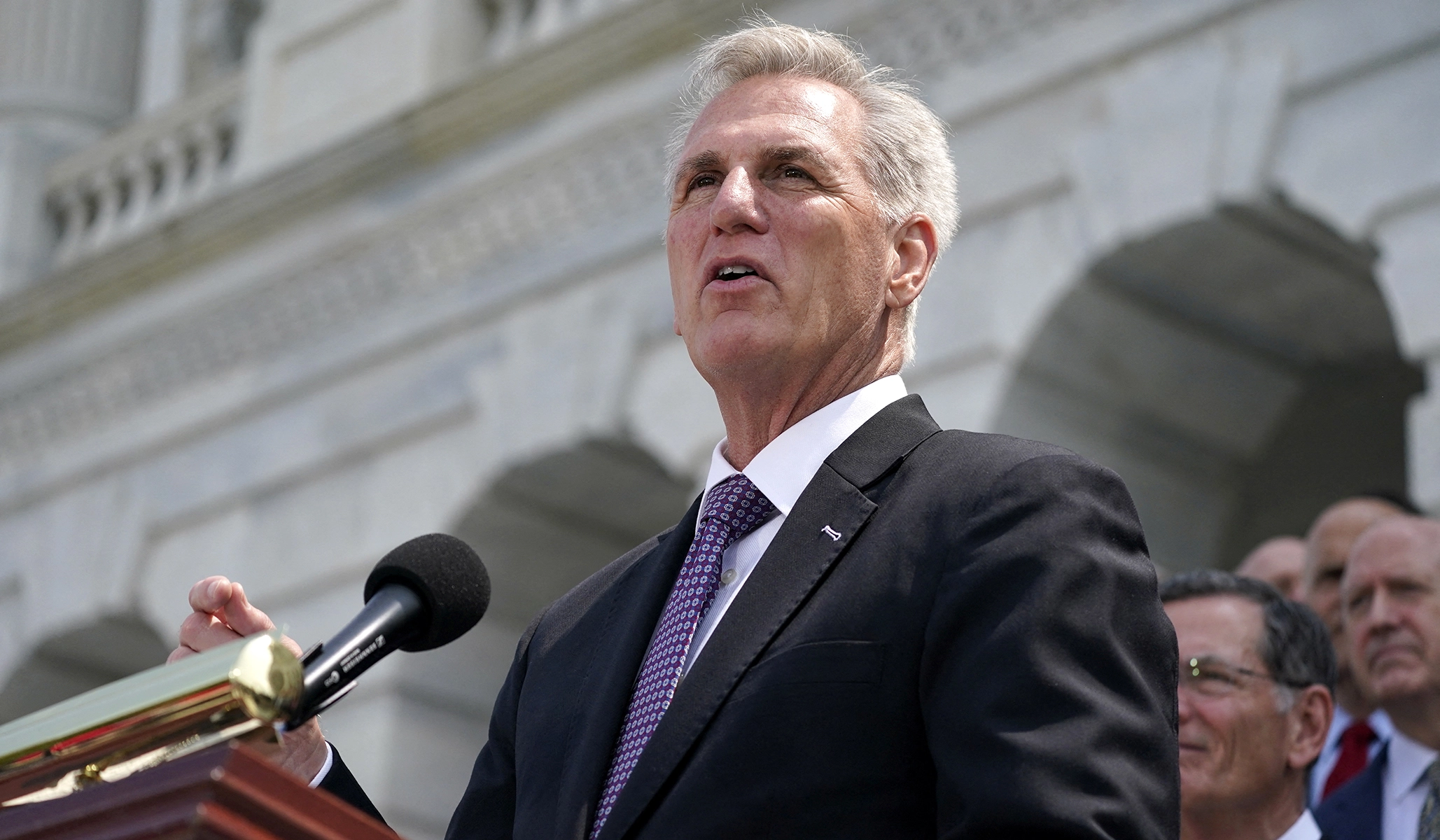Last Tuesday, an unprecedented event took place in the House of Representatives. For the first time in 21 years, a rule was voted down on the House floor. Eleven Republican members, breaking party lines, joined Democrats in sinking the rule. The rule in question refers to a set of instructions that determine which legislation is eligible for consideration and what kind of debate will be allowed. These rules, crafted by the Rules Committee, shape the House’s agenda, particularly for politically contentious bills.
It’s worth noting that the defecting Republicans didn’t actually oppose the rule they voted against. They supported the bills being brought up and agreed with the terms of debate outlined in the rule. However, their objective was to embarrass their party’s leaders, particularly Speaker Kevin McCarthy, due to their dissatisfaction with the recent debt-limit deal. They have even expressed their willingness to vote against all their party’s rules until their concerns are addressed.
This raises questions about the implications of this internal conflict within the House Republicans. Does McCarthy’s leadership become compromised, and if so, are there alternative options for managing the chamber? Will these eleven members now have significant influence over decision-making?
Back in December 2022, when McCarthy’s path to the speakership was uncertain, some predicted that even if he secured the position, he would have limited power. Steve Bannon, a prominent figure on the far right, suggested that Representatives Matt Gaetz and Marjorie Taylor Greene would become de facto speakers, wielding power behind the scenes. Media coverage of the speakership struggle seemed to support this notion. McCarthy only secured the speakership by striking a complex deal with a group of fourteen Republican members led by Representative Chip Roy. As part of the agreement, Roy, Ralph Norman, and Thomas Massie were given seats on the House Rules Committee. This committee is heavily skewed in favor of the majority party, with nine seats for Republicans and only four for Democrats. There were also reports of other undisclosed commitments, as the conservative dissenters were concerned about McCarthy making deals with Democrats. Notably, the dissidents were empowered with the ability to force a no-confidence vote on the speaker through a motion to vacate the chair.
However, McCarthy eventually struck a deal with Democrats, which passed into law despite opposition from Gaetz, Roy, and other lawmakers who opposed his ascension in January. The bill received significant support from both Republicans and Democrats. Although the bill’s passage was not in doubt, the rule bringing it to the floor faced some uncertainty. It narrowly passed the Rules Committee, with Roy and Norman voting against it. On the House floor, 29 GOP members opposed the rule, making it clear that Republican votes alone would not be enough for its passage. Ultimately, 52 Democrats supported the rule, leading to its approval by a vote of 241-187.
This raises the question of why the opponents of the deal couldn’t stop it, despite the concessions they had extracted from McCarthy. The dissidents had criticized the concentration of power in the House and demanded greater control over legislation. However, the debt-limit deal, like previous agreements, was brokered by congressional leaders and ratified by a bipartisan majority. It became evident that the leverage provided by the motion to vacate the chair was more illusory than real. Some GOP dissenters have expressed a desire to use this leverage to topple McCarthy, but they haven’t done so because they would likely lose. Democrats, having witnessed McCarthy’s ability to negotiate in good faith with President Biden, have little incentive to cooperate with the bomb-throwers in the GOP conference. McCarthy has no clear rival with broader support among Republicans. While a challenge to his speakership would be distracting and potentially embarrassing, McCarthy made the deal with confidence in his ability to weather the backlash from the right.
The dissenters have demonstrated their ability to block legislation that lacks Democratic support. This has undoubtedly given Republican leaders pause. In the current hyperpartisan climate, the majority party focuses on passing bills that align with its talking points and put political opponents on the defensive. Two bills recently voted down in the rule perfectly fit this mold, addressing the contentious issue of gas stoves. McCarthy and other GOP leaders will be disappointed if they can’t advance such bills.
However, the dissenters’ leverage shouldn’t be overstated. In the current political landscape, where Democrats control the Senate and the White House, the chances of any bill passed solely by House Republicans becoming law are virtually nonexistent. Failing to pass these bills may be disappointing in terms of messaging, but it has little practical impact. Republicans can still claim they championed their preferred causes, like gas stoves, and attribute the failure to opposition from Democrats.
If McCarthy’s critics want to have a more significant impact on reshaping the House, they would need a positive agenda that entices Democrats. This is where the three seats on the Rules Committee, which the dissidents secured, could come into play. With three dissident Republicans and four Democrats, they could outvote the six loyalist Republicans. However, it remains unclear whether McCarthy’s Republican detractors have any plans to collaborate with Democrats on any issues.
Meanwhile, McCarthy must collaborate with Democrats on crucial legislation, such as spending bills and the national defense authorization bill. There is no reason why they cannot replicate the debt-limit deal and pass legislation against the objections of dissenting Republicans. If McCarthy finds his party unable to push partisan bills across the finish line, he may focus on improving prospects for bipartisan coalition-building. In other words, if McCarthy’s critics aren’t careful, they may inadvertently push him further into the bipartisan-dealmaking mode that has already angered them.
Looking back at the late 1950s, the Rules Committee held significant independent power. Its chairman, Representative Howard W. Smith, actively opposed many of his party’s policy goals, particularly on civil rights. Smith’s ability to block legislation was legendary, and his influence stemmed from his collaboration with a bipartisan group of conservative members who could outvote Democratic liberals. McCarthy’s critics lack a comparable power base in today’s House, making Bannon’s comment about “de facto Speaker Gaetz” perplexing. It never made sense to assume that a few dozen members could dictate the House’s agenda solely through their stubbornness. Historically, the Freedom Caucus exerted influence through the Republican Conference, lobbying leadership and using mechanisms like the Hastert Rule to obstruct legislation they opposed.
This isn’t to say that the rules changes secured by Roy and his allies in the speakership fight are inconsequential. If McCarthy delivers on his promise to allow more open debate and consideration of amendments on the House floor, it could benefit ambitious policy entrepreneurs and enhance the chamber’s ability to prioritize legislating. However, it is the moderates in the House, rather than those on the extremes, who are best positioned to take advantage of a regime that allows bipartisan coalitions to advance legislation without enthusiastic support from party leaders. Republican moderates have thus far stood united behind McCarthy, which made sense given the lack of incentives from Biden during the debt-limit fight. It remains to be seen whether they will assert themselves independently of leadership in the post-Pelosi era.
Will we look back at the 2023 speakership fight as a pivotal moment in House history? There are no guarantees. It’s possible that the 15 rounds of voting will be seen as a testament to Republican obstinacy in this political moment. However, there is still time for members, not necessarily the original insurgents, to seize the opportunities presented by the deal McCarthy was forced to make.

